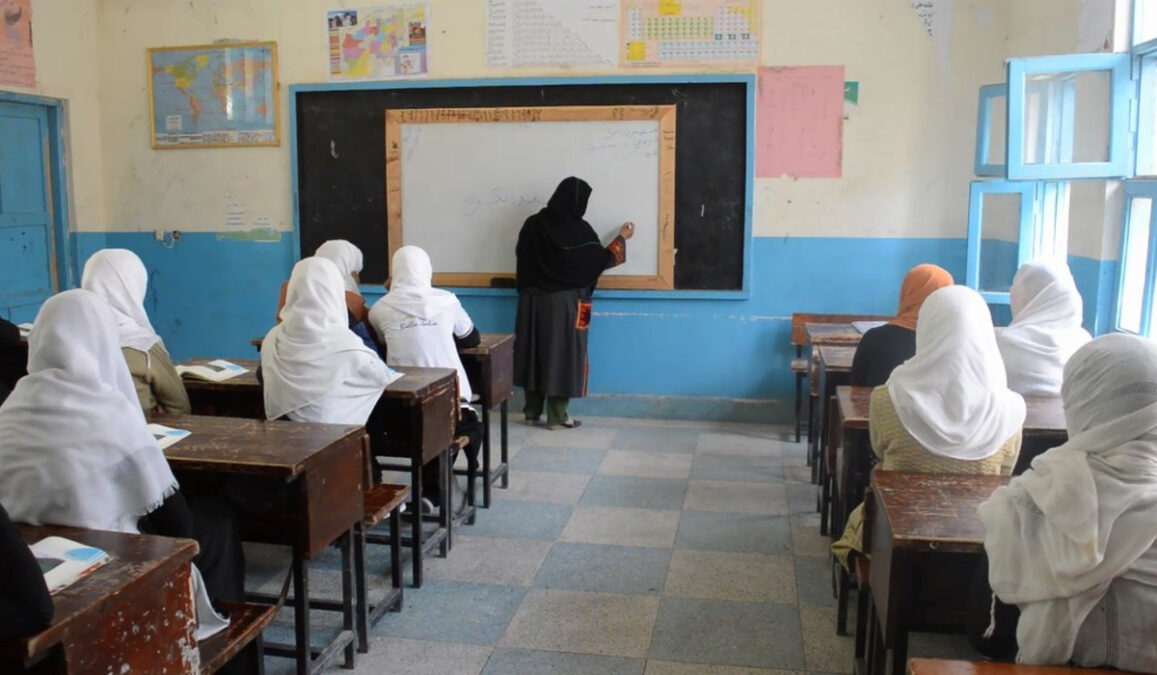KABUL, Afghanistan — Female government employees and schoolteachers expressed grave concerns on Monday over a new Taliban decree reducing their monthly salaries from 10,000 to 15,000 Afghanis ($142 to $213) to a uniform 5,000 Afghanis ($71).
They condemned the decision as an “unjust” and significant setback for women who are already facing stringent restrictions under the Taliban rule. The women warned that this drastic pay cut will lead to severe economic hardships, leaving their children hungry.
Last week, the Taliban leader issued a decree setting the salaries of all women employed by the previous government, now being paid by the Taliban, at 5,000 Afghanis. This new policy is poised to profoundly affect the livelihoods of thousands of female teachers and government employees.
According to the decree, all women who were employed by the previous government and are now under the Taliban’s payroll will see their salaries reduced to 5,000 Afghanis. The decree states: “All women employed by the previous government in administrative roles, and who are currently receiving salaries from the Islamic Emirate (Taliban), will have their salaries standardized at 5,000 Afghanis, regardless of their previous wages.”
The Taliban did not clarify whether this salary cap applies to current employees working under their administration or only to those hired by the previous regime. Additionally, it remains unclear whether the Taliban will reduce the salaries of female employees they have hired themselves.
Some female employees, including healthcare workers and schoolteachers, reported that they have been informed their June salaries would be adjusted to 5,000 Afghanis based on this new decree. Several teachers and female doctors in government institutions have criticized the Taliban’s decision, stating that it is a severe violation of women’s rights.
“I am the sole breadwinner for a family of five. How can I cover our expenses with just 5,000 Afghanis? There are bills to pay and rent to cover; it’s simply not enough. We haven’t received our salaries for two months now, and many women have lost their jobs. Those still employed either receive their salaries late or face continuous reductions,” said Sosan, a teacher.
“With our salaries suddenly reduced to 5,000 Afghanis, how am I supposed to pay rent, buy food, and cover other necessities?” added Nargis, another teacher.
Hajara, a teacher at a government school, tearfully expressed her worries about supporting her family of ten. She mentioned that her unemployed husband relies on her income. “If the Taliban’s decree is enforced, I won’t be able to provide for my family anymore,” she said. “My salary was 10,000 Afghanis and is now being reduced to 5,000. This is a severe blow to those of us who are the sole providers for large families.”
In 2018, the United Nations reported that there were 81,000 female teachers in Afghanistan. However, the Taliban’s Ministry of Education now states that this number has dropped to 51,000. Additionally, the number of female healthcare workers is estimated at 10,000. With this decree, the incomes of approximately 61,000 families will be significantly affected.
Women’s rights activists have also criticized the Taliban’s decision.
Mawluda Tawana, a women’s rights activist, stated: “This draconian salary cut imposed by this regressive and patriarchal regime epitomizes their deep-seated misogyny and cruelty towards Afghan women.”
Since regaining power, the Taliban has systematically stripped women of their fundamental rights, including education, employment, and freedom of movement. These measures have repeatedly drawn condemnation from international organizations, but the Taliban has shown no signs of reversing their decisions.
Further Implications
The economic implications of the Taliban’s wage cuts are likely to exacerbate the already dire humanitarian situation in Afghanistan. The United Nations has warned that more than half of Afghanistan’s population faces acute hunger, and the reduction in salaries for female employees will only worsen this crisis.
International human rights organizations have called on the Taliban to reverse the decree and uphold women’s rights to work and receive fair compensation. They argue that the Taliban’s policies are not only detrimental to women but also to the country’s overall development and stability.
As the international community continues to monitor the situation, Afghan women remain resolute in their demand for justice and equality. “We will not be silenced,” said Tawana. “Our fight for our rights continues, and we call on the world to stand with us in solidarity.”
The Taliban has yet to respond to these growing criticisms, and it remains uncertain whether any amendments to the decree will be made. Meanwhile, Afghan women are bracing for the impact of these cuts on their lives and their families.





